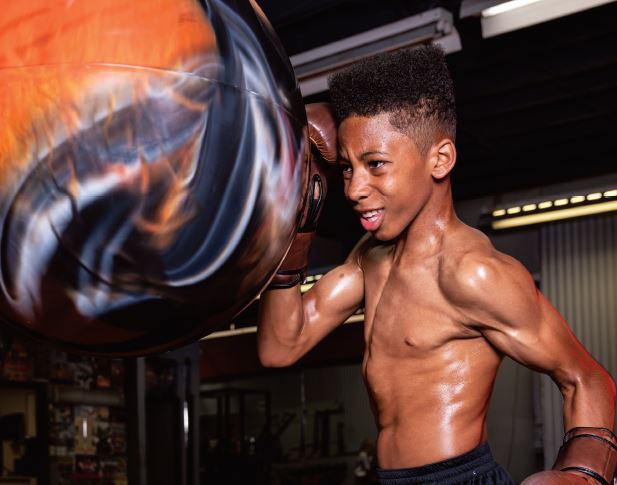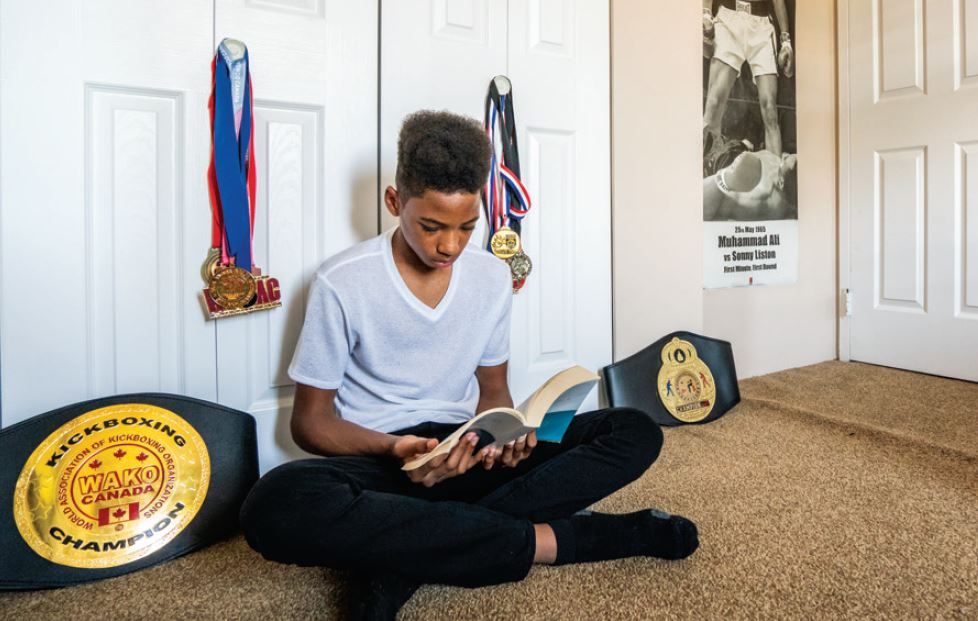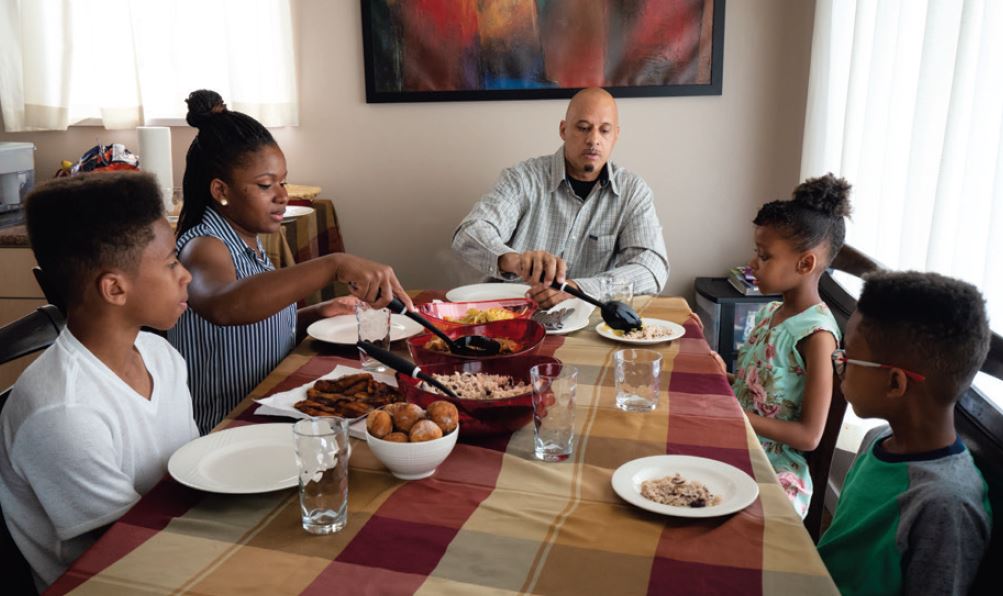
When 12-year old Joseph Brown looks you in the eye with an intensity beyond his years and says he’s going to represent Canada in the Olympics and become a professional boxer, you believe him.
You somehow believe in him, too. Even before you learn he dedicates five to six hours a day to training. Even before you can blink at the many titles already under his belt. Even before you meet his family and begin to understand the incredible support system behind him.
Joseph’s future may be bright, but part of his story stems from what his parents have determinedly overcome to provide him and his siblings with greater possibilities.
Northward and upward
Joseph’s parents, Martin and Melissa Brown, both came from abusive family backgrounds. But—by luck, faith, or both—by the time they met in church in Florida in September 2005, they’d each found a spiritual path to shed old toxicities and embrace a healthy, positive life together.
They got married within three months.
Soon afterward, Joseph was born. And eventually, Makayla (now eight) and Isaiah (now seven). Again—by luck, faith, or both—all three children have the same birthday as their father.
The Browns wanted more for their children than a life of struggle in a community outside of Miami. Around the same time that Joseph’s early athletic abilities were becoming apparent, Martin and Melissa began the immigration process to Canada.
First came Martin, a Canadian by birth, in December 2012 with $700 in his pocket. He quickly found two jobs and an apartment. He still gets teary-eyed at how agonized he felt, alone and waiting for news about his wife and kids. Finally, after an emotionally traumatic immigration snafu that resulted in the fast-tracking of their file, the rest of the Browns arrived in February 2013.
In the years since, they’ve applied resilience and a capacity for transcendence in building a local network of friends and community connections, all while staying true to themselves.
“As a family unit, we hold each other accountable,” says Melissa. “We sit down and talk about our goals. We’re committed to it—support for each other and being consistent.” They practise faith, prioritize exercise and nutrition, and eat together. This carefully cultivated family bond is the platform upon which Joseph is able to build his successes.

A goal is born
At age six, Joseph first got a glint in his eye for boxing. “I like all martial arts,” he says. “Fighting, and watching.” It was a glint his father recognized because Martin himself had competed back in the day. Under his father’s tutelage, Joseph’s training began.
He began taekwondo at age seven and, with a blue belt, Joseph won his first championship at eight. Soon came the Master’s Cup tournament, then provincials, then nationals, all of which he won too.
At 11, he achieved a black belt in taekwondo. An achievement that normally takes years took Joseph 11 months. When asked how he manages to stay committed, he replies, “If I go through this now, it’s all going to pay off.”
The accolades and awards have since piled up. To name a few: three-time Muay Thai provincial kickboxing champion, four-time Master’s Cup taekwondo champion, 2017 taekwondo national champion, 2019 Battlefield kickboxing champion, 2019 kickboxing national champion.
The day after he turned 11, in his first boxing match, Joseph had the fastest recorded knockout in amateur Canadian boxing history—the second-fastest in the world, beaten only by Mike Tyson.
Each of Joseph’s siblings are encouraged to follow their own passions, whether reading or sports (they also all kickbox). Joseph’s dream has meant giving up some social stuff like big birthday parties. Yet don’t call it a sacrifice. He’s the typical preteen who enjoys going to the trampoline park, watching TV, playing video games, or being outside with his siblings. Call it being a normal kid with high commitment.
Given his rigorous training, this top scholar doesn’t have time for much homework, so he finishes in class. If not, you’ll find him squeezing it in while waiting for a doctor’s appointment.
You won’t find him complaining, though. The first time he held a winning medal in his hand made the perseverance worth it. Now his focus is boxing. “I don’t really have doubts,” he says. “Training can be hard. Whenever it’s hard, I think about the end goal. A lot of people tell me I’m very focused.”
Shared family focus
Without a doubt, the Browns’ dreams for their family have required their unswerving dedication. Melissa and Martin both work two jobs, while Melissa is somehow finding time to finish a university degree. They started a GoFundMe page to help with Joseph’s costs: gofundme.com/josephbrown.
When asked how they manage it all, Martin says, “You make a plan, 24 hours. If we’re having oatmeal in the morning, we make it the night before. Little things like that; we preplan everything.”
As for their diet, everything is organic, despite the cost. No sugary junk foods in their home. Pick your snack from a big bowl of fruit. Plenty of salads and whole grains. Proteins are fish and chicken, lean meats. Joseph’s favourite, the odd pizza? OK, on occasion.
“We believe in a healthy lifestyle; our kids get sick less than most. They’re more energetic and alert; their attitudes and emotions are good,” says Martin, who followed the philosophies of Bruce Lee and is now happy to bring that to his family. “When your body feels good, you feel good.”
And when they say they’re in it together, they mean it. One time, due to technical oversight, Joseph came in high for his weight class and needed to shed several pounds over four days. Martin and his son ate the exact same foods, such as big salads, eggs sliced in two, shared bananas. At the next weigh-in, father and son achieved their goal. Joseph won that championship too.

Benefits of exercise
Only 38 percent of Canadian children and youth aged five to 17 get the recommended minimum of 60 minutes of moderate-to-vigorous exercise per day. “Moderate-to-vigorous” activity
means those that will cause kids to sweat, breathe harder, or be out of breath. Why is
this important?
Physical activity helps you:
- improve cardiovascular health, strength, and flexibility
- build bone density
- support a healthy weight
- feel better via mental health benefits
- reduce the risk of drug or alcohol use
- lessen the risks of chronic disease and health problems
Giving back
At the same time that Joseph’s star is rising, the Browns’ attention is also caught by down-swinging community currents. For them, life is about more than overcoming ugly patterns of the past; it’s about being grateful and giving back.
Although Joseph has, till now, been humble and has not shared his ambitions with too many people, he’s ready to be a more active role model in his community. With his parents’ support, he’s hoping to travel to local schools and to be someone more kids can connect with, some of whom have been touched by drugs, abuse, and mental health issues.
The professional boxing ring, and indeed Olympic rings, may well be in Joseph’s future, but in the meantime, the Browns are golden in family and community spirit.

Prepping for the ring
As Joseph’s current coach, Martin always incorporates some physical basics in Joseph’s routine, such as push-ups, squats, sprints, and sit-ups. But here are some of his other sport-specific exercises.
Jump Rope
This is one of the best exercises that boxers do.
Benefits: coordination, endurance, footwork
- Standing straight, place the rope behind you and turn the rope over your head while jumping, lifting your toe and heel until
the rope is over your head. - Repeat.
Joseph: will jump rope for 10 rounds, 3 minutes each.
Beginner recommendation: 3 rounds, 2 minutes each.
Shadow Boxing
Every boxer incorporates this exercise in their workout routine, because it helps them train for a fight by simulating movements that could be used in a fight.
It’s also a great warm-up routine.
Benefits: whole body cardio workout, improved coordination, better footwork, builds strong core muscles
- Stand on the balls of your feet, elbows raised in fight stance, and pretend there is an
imaginary opponent in front of you. - Throw punches and move as if you are engaging in a real fight.
Joseph: will do 10 rounds, 2 to 3 minutes each
Beginner recommendation: 3 rounds, 2 minutes each.
Sit-up Punch
This is a good way for boxers to build their core while engaging their upper body muscles.
Benefits: strong core, helps with taking body shots
- Lie down on your back with knees bent and feet on the floor.
- Come up to sit-up position and throw two punches—left hand first, then the right hand.
- Lie down again. Repeat.
Joseph: will do 300 sit-up punches..
Beginner recommendation: 3 rounds of 15 to 20 sit-up punches.
Burpees
This is an overall great cardio workout for boxers.
Benefits: builds endurance, builds leg muscle that helps boxers stand firm
- Start in a standing position.
- Move into a forward squat position with your hands on the ground.
- Kick your feet back so you end up in a planking position, hands and feet both on the ground.
- Jump your feet back in to squat position.
- Stand and repeat.
Joseph: usually does 100 burpees.
Beginner recommendation: 3 rounds of 10 to 15 reps
Vancouver writer Michelle Hancock anticipates the day she’ll see Joseph Brown representing Canada in the Olympics, and his family cheering in the stands.
For more information on Joseph Brown visit:
facebook.com/josephbrown.boxer
@josephbrown.boxer
gofundme.com/josephjbrown



































